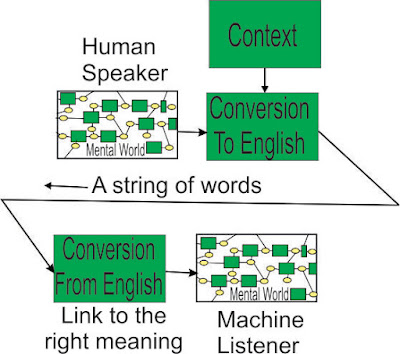LLMs and English
The latest thing is using LLMs to understand English. This is very far from the use of LLMs by a Search Engine – an LLM can find a match for a particular word combination in thousands of documents. The number of documents involved means that it doesn’t have to worry about using synonyms.
Some examples:
“the path form for the viral swab is attached”
See another post on this blog – Semantic AI and LLMs – for “bar”, and its journey from iron bar to the legal profession.
“He has his work cut out for him”
This one is harder. Wiktionary says “to face a large task or project”. Other dictionaries talk about both the challenge and the effort to accomplish it. A similar phrase with a completely different meaning - “he had his car cut out on him”.
The phrase can shape-shift. John, no stranger to hard work, is going to have his work cut out for him on this assignment.
LLMs are all the go at the moment – why not use them to read and understand English? There is a very good reason – English is full of quirks, figurative meanings, and idioms – you end up with a tool that works on the very simple stuff – falls apart even on some simple stuff, which really cheeses people off ("cheeses" is one). If you don’t want to “cheese off” your users, LLMs are not the way.
“the path form for the viral swab is attached”
What is a “path form”? It is shorthand for “pathology form”, which the machine could know by looking at it, or by realising that this is the patois of people working in a hospital. OK, brute force might get the LLM there, but with no understanding of the words or the environment in which they are used, so no easy way to prune the search space,, You would be looking at a huge library of possibilities.
The car turned on a dime.
He turned on the light.
“on” can be a preposition or an adverb – he turned the light on.
The car turned on a dime.
He turned on the light.
“on” can be a preposition or an adverb – he turned the light on.
See another post on this blog – Semantic AI and LLMs – for “bar”, and its journey from iron bar to the legal profession.
“He has his work cut out for him”
This one is harder. Wiktionary says “to face a large task or project”. Other dictionaries talk about both the challenge and the effort to accomplish it. A similar phrase with a completely different meaning - “he had his car cut out on him”.
The phrase can shape-shift. John, no stranger to hard work, is going to have his work cut out for him on this assignment.
In semantic terms, there is a structure associated with the phrase that checks "he", "his" and "him" to ensure they all refer to the same person. "she has his work cut out for him" must mean something entirely different - he is a tailor perhaps. In LLM terms, no such structure.
If there is a string of prepositional phrases, it can be difficult wo work out the target of each when you know the meanings of the words, let alone doing it not knowing what the words mean.
If there is a string of prepositional phrases, it can be difficult wo work out the target of each when you know the meanings of the words, let alone doing it not knowing what the words mean.
LLMs are all the go at the moment – why not use them to read and understand English? There is a very good reason – English is full of quirks, figurative meanings, and idioms – you end up with a tool that works on the very simple stuff – falls apart even on some simple stuff, which really cheeses people off ("cheeses" is one). If you don’t want to “cheese off” your users, LLMs are not the way.



Comments
Post a Comment